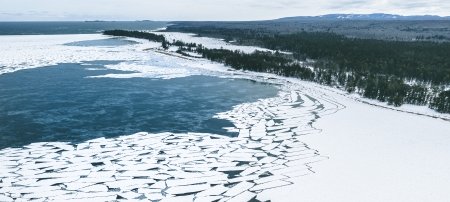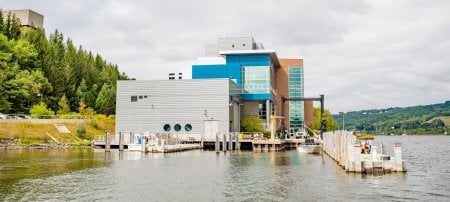State Authorizes $25 Million for Great Lakes Research Lab at Michigan Tech
Michigan Technological University has long been a leader in research related to the Great Lakes. Now that research is going to have a new home, on the campus waterfront.
Today, Lt. Governor John Cherry, acting for Governor Jennifer Granholm, signed a capital outlay bill authorizing Michigan Technological University to spend $25 million to build a Great Lakes research center along the Portage Canal on the University's campus.
Michigan Tech is one of six state universities with capital outlay projects funded by the bill. The others are Eastern Michigan University, Ferris State University, Oakland University, Saginaw Valley State University and Western Michigan University.
The project will include construction of a three-story research building and enhancement of Michigan Tech's waterfront, said W. Charles Kerfoot, professor of biological sciences and director of the Lake Superior Ecosystem Research Center. A planning committee guiding the project includes Kerfoot; Professor Alex Mayer, director of the Center for Water and Society; and Joan Chadde, coordinator of educational programs for the Western Upper Peninsula Center for Science, Mathematics and Environmental Education.
The new building will be located on the canal side of the Dow Environmental Sciences and Engineering Building. It will house eight research labs with researchers from four departments: biological sciences, civil and environmental engineering, geological and mining engineering and sciences, and chemistry. Researchers from the Michigan Tech Research Institute will bring their remote sensing expertise to the new facility.
"Freshwater issues are among the most pressing problems facing the world," said Michigan Tech President Glenn D. Mroz. "Michigan Tech is ideally situated to become a leader in aquatic environmental science and technological remediation. The interdisciplinary work that Michigan Tech researchers will do in this new research center on all aspects of Great Lakes water has implications for freshwater management far beyond Michigan. What we learn there will be valuable worldwide."
The new center will focus on a number of pressing issues in upper Great Lakes coastal research, including research into the effects of global climate change, the impact of invasive plant and animal species, over-fishing and the reproductive failure of native fish, loss of coastal wetlands and habitats along tributaries that feed the Great Lakes, historical contamination from mining and the impact of toxic contaminants that persist, and the effects of population and pollution on coastal biodiversity.
A broad variety of research labs will draw faculty and students from disciplines across campus. They include a fisheries restoration lab, a sediment characterization and processing lab, a mass spectrometry lab where large samples can be screened quickly for different compounds, a coastal hydrology lab for controlled testing of sediment behavior under various river and coastal flow conditions; an exotic species lab; a model computation lab, a remote sensing and coastal instrumentation networking lab; and an air quality and meteorology lab.
As a hub for Great Lakes research and education, the waterfront facility will also house classrooms, teaching labs, conference rooms and facilities to expand educational outreach program for elementary and high school students and teachers. The building will include a boathouse and water-level access for the University's research vessels, the Agassiz and Polar. Access to such facilities will help motivate future generations to study and pursue careers in science, engineering and technology.
Future plans for the project envision a waterfront activities center, including boat launching ramps, storage for water craft of all kinds, decks and docks, a shoreline boardwalk, a walking trail, improvements to Prince's Point Beach, and mooring and staging facilities for large ships.
"Michigan Tech has a unique location on a coastal Great Lakes waterway," Kerfoot said. "Now it will have the waterfront presence it has lacked."
Michigan Technological University is an R1 public research university founded in 1885 in Houghton, and is home to nearly 7,500 students from more than 60 countries around the world. Consistently ranked among the best universities in the country for return on investment, Michigan's flagship technological university offers more than 185 undergraduate and graduate degree programs in science and technology, engineering, computing, forestry, business, health professions, humanities, mathematics, social sciences, and the arts. The rural campus is situated just miles from Lake Superior in Michigan's Upper Peninsula, offering year-round opportunities for outdoor adventure.




Comments